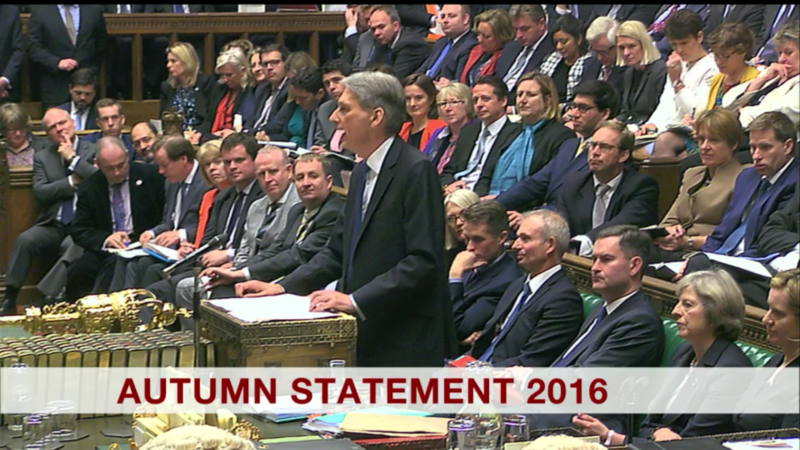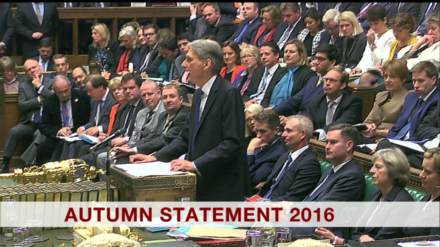

Last week’s Autumn Statement was a turning point for this government. With downgraded forecasts and abandoned targets, it revealed an economy in decline. And, of course, it was the first instalment of the bill we will all have to pay for leaving the European Union.
The independent Office for Budget Responsibility provided the detail. Growth next year has been cut from 2.2 per cent to 1.4 per cent. Borrowing will rise by £58.7 billion as a direct result of Brexit – a cost of £226 million a week. Debt will reach almost £2 trillion in 2020. And by that time, the economy will be 2.4 percentage points – or £26 billion – smaller than it otherwise would have been, were we not leaving the European Union.
At this time of huge challenge and change for the British economy, the question for the Government in the months to come is whether it is able to respond in the national interest. It is the most important question any government has faced for a generation, and in addressing it, Labour should set the Government three tests.
First, is it doing all that it can to minimise any further harm to growth and jobs?
Second, is it advancing the interests of the whole of society, promoting fairness and protecting the living standards of all?
And third, does it begin to restore faith in our politics after the shock of the referendum by honouring the promises made to the British people?
To meet the first test, to minimise further harm to our economy, a government acting in the national interest would immediately make a firm commitment to remaining a member of the single market.
Failure to do so would be devastating to Britain’s future prosperity.
So in signalling it would be willing to leave the single market, that it favours an extreme hard Brexit, the Government is failing this crucial first test. It is not acting in the national interest, but in a narrow Party interest, more concerned with the needs of their parliamentary majority than the economic needs of the nation.
It is this same narrow interest that is driving the government’s determination to cut immigration, even at the expense of future growth, jobs and living standards. So it is welcome that the Chancellor put into the public domain the cost of doing so.
He revealed that the UK would need to borrow an additional £16 billion by 2020 to make up for the reduced tax take caused by falling migration, with a further cost of £8 billion every year thereafter.
It is to be hoped that having these costs in the public domain might begin to raise the standard of debate in this country about immigration, and might cause those who are pushing us relentlessly towards an ever more anti-immigration position to reconsider. Perhaps it might even halt the spread of anti-immigration rhetoric, which having once been confined to the far-right of politics, is now spreading across the political spectrum, including regrettably into elements of my own party. Although perhaps I say this more in hope than in expectation.
The second test for Brexit seeks to ensure the government advances the interests of the whole of society, promoting fairness and protecting the living standards of all.
We will all have been heartened to hear so many words from the prime minister about her concern for working people who are struggling to make ends meet. But the Autumn Statement showed the reality. Household real incomes will fall next year as inflation rises. Unemployment will rise, and the fall in the value of sterling will increase the bills British families have to pay.
But they won’t have much to pay them with. According to the Resolution Foundation, average incomes will now rise over the next five years at less than half the rate they did in the last parliament, and the Institute for Fiscal Studies has calculated that real wages will still be below their 2008 levels in 2021.
So the government is failing this second test too. Their values mean they cannot govern for all in society. Once again, the poorest will pay the heaviest price, with the entire bottom third of the income distribution seeing their incomes fall.
The third test seeks to ensure the government honours the promises made to the British people, and in doing so, begins to restore faith in our democracy.
The previous chancellor argued that a fiscal straightjacket was necessary to maintain economic and financial confidence. This argument secured victory at the last two general elections, but now we discover that all the promises on the public finances have been thrown away, together with the government’s old fiscal rules.
All the sacrifices made by working people in their living standards and their public services were in vain. People are poorer, our public services are underfunded, but debt levels are even higher than where they began.
What then of the extra £350 million a week we were promised for the NHS? All too predictably, the Autumn Statement found not a single extra penny of investment for the NHS or social care.
The government will not restore faith in politics if it claims to care about working families while cutting their living standards; if they elevate cutting debt to a moral crusade and then increase debt; or if they promise more money for the NHS and then fail to even mention it at the first opportunity they have to keep that promise.
The Autumn Statement revealed a government in retreat, unable to act in the national interest. Only by being clear about the need to protect our economy, to govern for all in our nation, and to restore faith in our democracy, will Labour hold them to account.
Spencer Livermore is a Labour peer, a former advisor to Gordon Brown and ran the party’s general election campaign last year.




More from LabourList
Scottish Parliament elections 2026: Full list of Labour candidates for Holyrood
‘As metro mayors gain power, Labour must tighten political accountability’
Letters to the Editor – week ending 22 February 2026